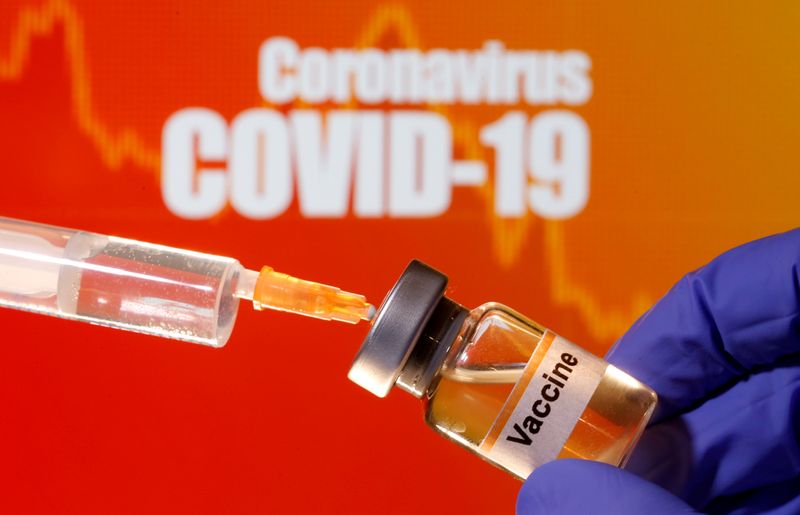By Julie Steenhuysen
CHICAGO (Reuters) - U.S. government scientists have begun efforts to manufacture a strain of the novel coronavirus that could be used in human challenge trials of vaccines, a controversial type of study in which healthy volunteers would be vaccinated and then intentionally infected with the virus, Reuters has learned.
The work is preliminary and such trials would not replace large-scale, Phase 3 trials such as those now under way in the United States testing experimental COVID-19 vaccines from Moderna Inc (O:MRNA) and Pfizer Inc (N:PFE), according to a statement emailed to Reuters by the National Institute of Allergy and Infectious Diseases (NIAID), part of the National Institutes of Health.
U.S. officials organizing the fight against the pandemic have been under pressure from advocacy groups such as 1 Day Sooner and others that see challenge trials as a way to speed up tests of a COVID-19 vaccine. Most vaccine trials rely on inadvertent infection, which can take time to occur.
Some drugmakers, including AstraZeneca (L:AZN) and Johnson & Johnson (N:JNJ), have said they would consider human challenge trials to test COVID-19 vaccines if needed.
"Should there be a need for human challenge studies to fully assess candidate vaccines or therapeutics for SARS-CoV-2, NIAID has begun investigations of the technical and ethical considerations of conducting human challenge studies," the agency statement said.
That includes efforts to manufacture a suitable SARS-CoV-2 strain, draft a clinical protocol and identify resources that would be required to conduct such studies.
Small challenge studies would be done in small isolation units to control the virus. Larger challenge studies involving 100 people or so would have to be done in multiple locations, adding months of preparations to coordinate the studies.
Such trials are typically done when a virus is not widely circulating, which is not the case with COVID-19. Many scientists consider human challenge trials of the novel coronavirus unethical because there are no "rescue therapies" for those who fall ill.
Earlier this week, Johan Van Hoof, global vaccines chief for J&J, said in an interview with Reuters that the preparations for such trials are under way across the world, and the company is following those preparations.
Van Hoof said such trials would offer a testing option in case the virus stops circulating widely, but the company would only move forward with such trials if the ethical issues are resolved and an effective treatment is available.
Dr. Anna Durbin, a vaccine researcher at the Johns Hopkins Bloomberg School of Public Health, who has run a dozen challenge studies, estimates it could take nine to 12 months to set up a human challenge trial, and another six months to coordinate testing across multiple testing sites.
NIAID said it is continuing to prioritize field trials to evaluate SARS-CoV-2 vaccine candidates, but it opened the possibility to challenge trials for future generations of vaccines or treatments.
Dr. Dan Barouch, a vaccine researcher at Harvard's Beth Israel Deaconess Medical Center in Boston, who helped design and conduct animal studies on J&J's COVID-19 vaccine, said he is not aware of any manufacturers planning human challenge studies.
"In the setting of a pandemic that is raging, you don't need it. You just do a trial and get a real result," he said.
Moreover, vaccine trials would have to be done in healthy young people, said University of Maryland School of Medicine's Dr. Kathleen Neuzil, co-leader of the Coronavirus Vaccine Prevention Network, which was formed by NIAID and is testing COVID-19 vaccines.

"A 20-year-old in a challenge study isn't really going to give us the answer of will this vaccine keep an older person, someone with chronic kidney disease, from ending up in the hospital," she said.